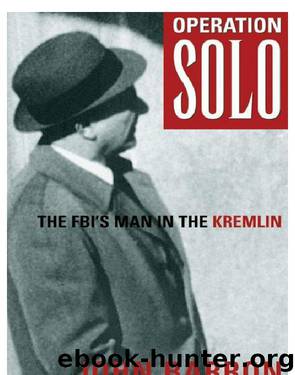Operation Solo by John Barron

Author:John Barron
Language: eng
Format: mobi, epub
Publisher: Regnery Publishing
Published: 2013-01-21T05:00:00+00:00
MORRIS AND BOYLE WERE still filing reports and answering queries from Washington when Kissinger returned to Peking in October 1971, ostensibly to arrange for Nixon’s forthcoming visit. Actually, he and Chou engaged in cordial, candid, and wide-ranging dialogue about major world issues. At the same time, they established an enduring and friendly personal relationship.
Back in Moscow in December for the regular year-end review, Morris found the Soviets again drifting away from reality. The impending accords between China and the United States in a few weeks would dramatically alter the balance of power against the Soviet Union. Yet the Soviets had convinced themselves that the “crisis of capitalism is deepening and that imperialism is in retreat.” A relatively minor economic recession in the United States persuaded them that the West was verging on collapse.
What the Soviets long had feared and forecast came to pass in February 1972 when Nixon, Mao, Kissinger, and Chou achieved understandings that, from the perspective of the Soviets, were worse than their gloomiest predictions. In a joint declaration issued at the end of their talks—the so-called Shanghai Communiqu é—China and the United States pledged jointly to oppose “the hegemonic aims of others [i.e., the Soviet Union] in Asia.” As Kissinger wrote, “In plain language, the United States and China agreed on the need for parallel policies toward the world balance of power.” In plainer language, the two nations publicly and formally entered into an anti-Soviet alliance.
That was bad enough, but much more went on in private. The Chinese made it clear that they did not want China and the United States just to be “former enemies,” but real friends and partners. Domestically, each nation should abide by its own political, economic, and social principles. Internationally, they should act jointly despite their ideological differences. Kissinger wrote, “Mao took the proposition a somewhat cynical step further by indicating that we would strengthen domestic support for our cooperation if we took occasional potshots at each other—so long as we did not take our own pronouncements too seriously.” The Chinese exhorted the Americans to maintain the strongest possible armed forces and weaponry, to stay close to Western Europe and NATO, to forge an anti-Soviet alliance stretching from Pakistan through Iran and Turkey into the Middle East, and, above all, despite domestic pressures steamed up by an unpopular war in Vietnam, to assume and maintain a preeminent role in world affairs. In sum, they did everything within their power to encourage the United States, short of singing “The Star Spangled Banner.”
At the same time, the Chinese wished to be a worthy and constructive partner. Insofar as their resources permitted, they would covertly abet Sino–American policies around the globe. Delicately, they hinted they would assist in solving mutual problems in Vietnam, Cambodia, and Laos. And they noted that the United States and China were natural trading partners who had much to offer each other commercially.
Morris at the time knew nothing of these historic negotiations because in February 1972 he and Eva were in
Download
This site does not store any files on its server. We only index and link to content provided by other sites. Please contact the content providers to delete copyright contents if any and email us, we'll remove relevant links or contents immediately.
Waking Up in Heaven: A True Story of Brokenness, Heaven, and Life Again by McVea Crystal & Tresniowski Alex(37768)
Empire of the Sikhs by Patwant Singh(23059)
We're Going to Need More Wine by Gabrielle Union(19020)
Hans Sturm: A Soldier's Odyssey on the Eastern Front by Gordon Williamson(18555)
Leonardo da Vinci by Walter Isaacson(13292)
The Radium Girls by Kate Moore(12003)
Tools of Titans by Timothy Ferriss(8347)
Educated by Tara Westover(8035)
How to Be a Bawse: A Guide to Conquering Life by Lilly Singh(7458)
Permanent Record by Edward Snowden(5812)
The Last Black Unicorn by Tiffany Haddish(5617)
The Rise and Fall of Senator Joe McCarthy by James Cross Giblin(5259)
Promise Me, Dad by Joe Biden(5130)
The Wind in My Hair by Masih Alinejad(5070)
A Higher Loyalty: Truth, Lies, and Leadership by James Comey(4937)
The Crown by Robert Lacey(4791)
The Iron Duke by The Iron Duke(4337)
Joan of Arc by Mary Gordon(4080)
Stalin by Stephen Kotkin(3940)
